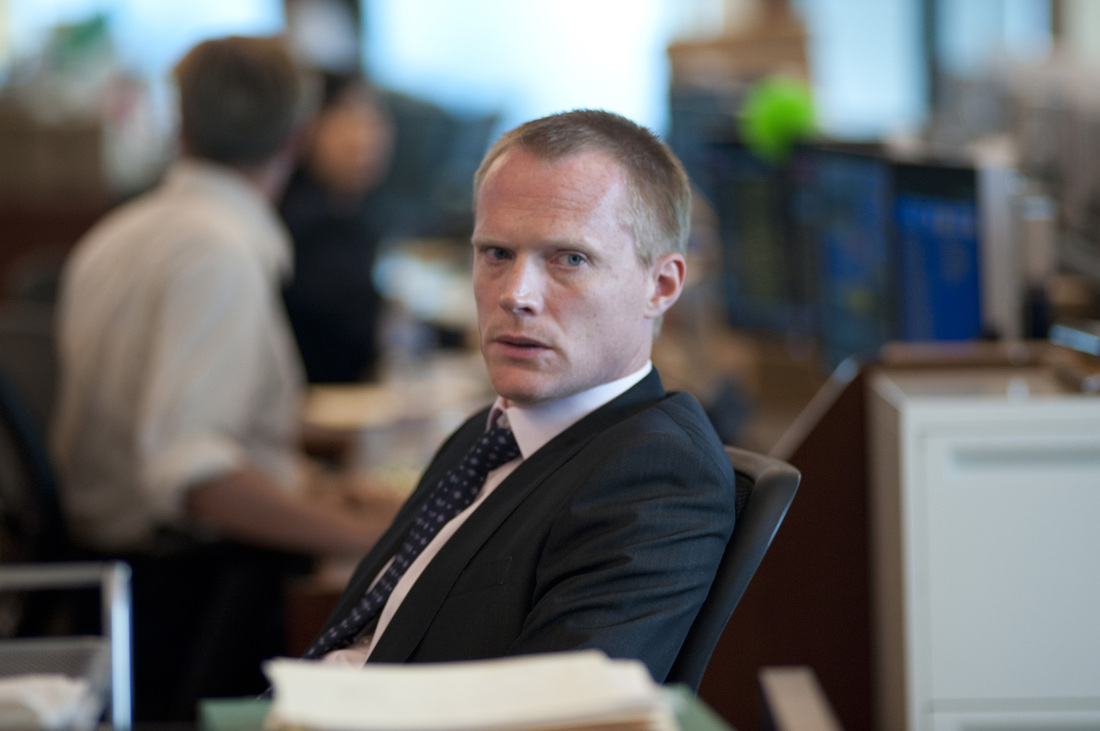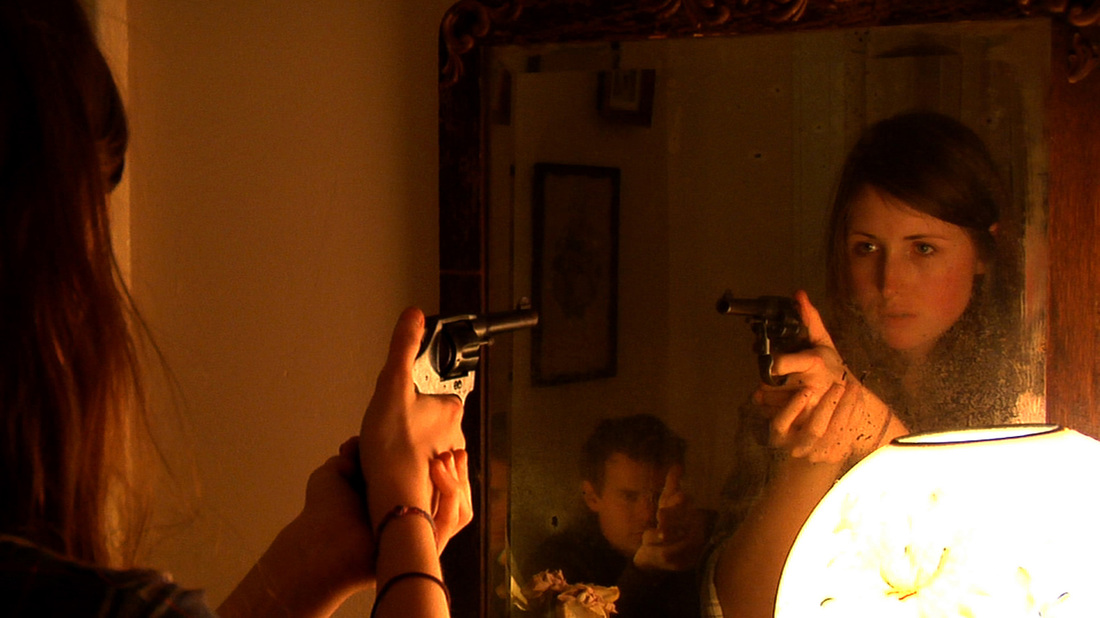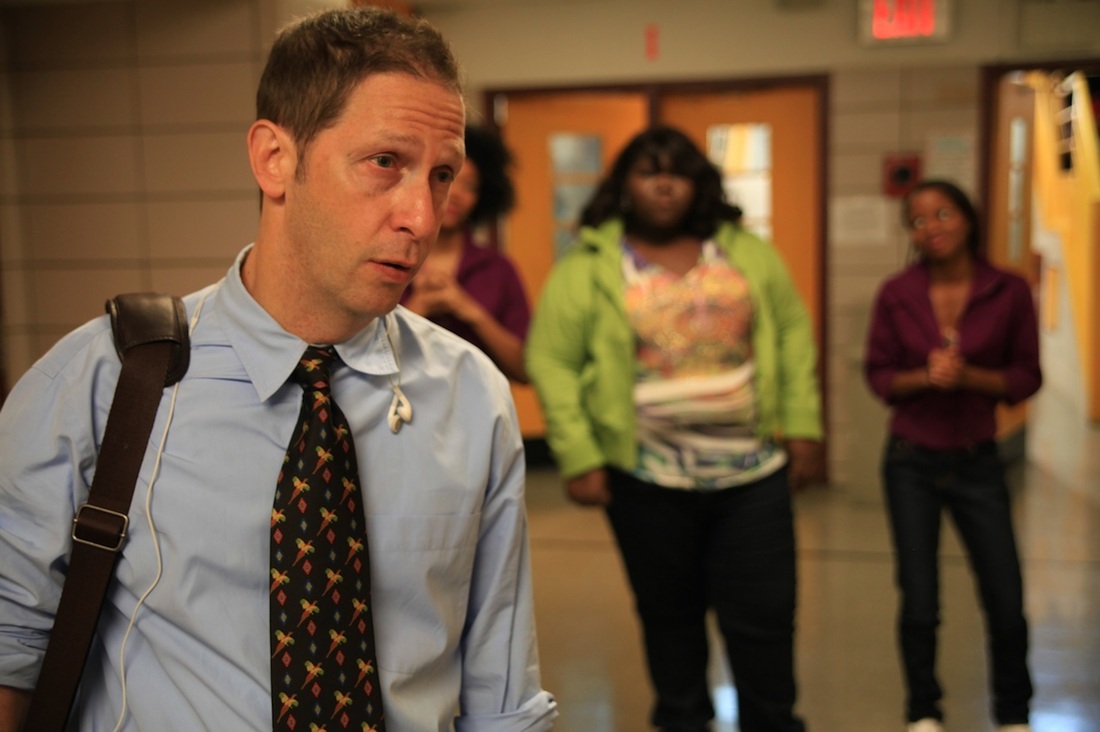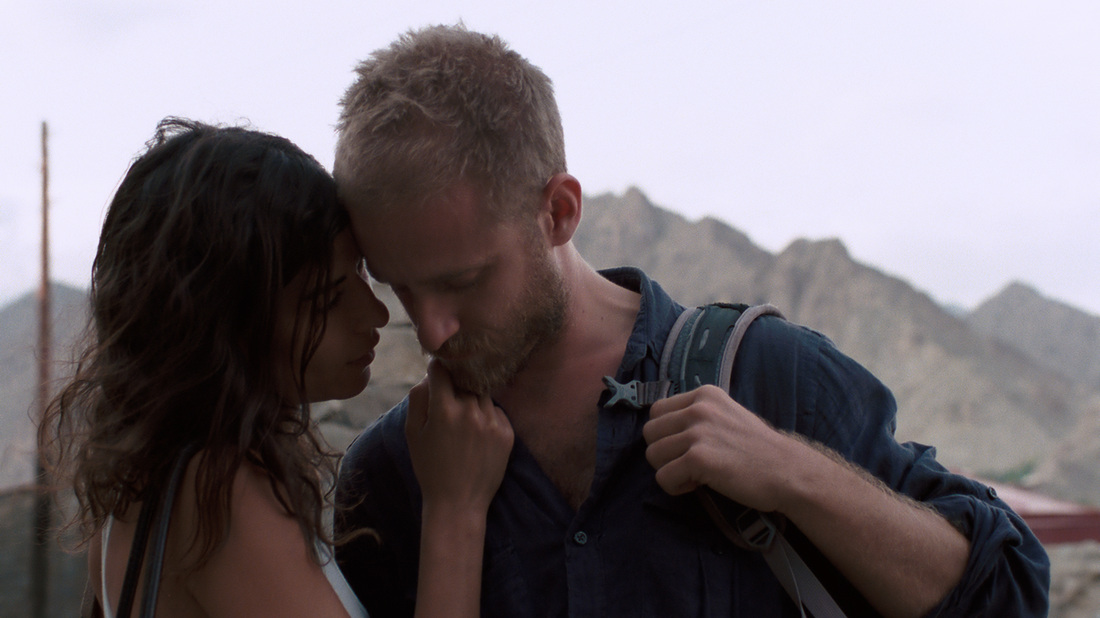14 March 2011
First off, wow! There was something like 400 films to see in just 10 days. 40 films a day is just not possible, unless you have one of those magical things Hermione has in HARRY POTTER AND THE PRISONER OF AZKABAN (where she is able to do multiple classes simultaneously). I have split up the Festival into three parts. Let’s begin...
Thursday 10th February
Press conference: Berlinale Jury
I kicked off with an intro to this year’s jury, headed up by legendary actress Isabella Rosselini. Joining her were Aamir Khan, Guy Maddin, Sandy Powell, Nina Hoss and Jan Chapman. Absent was imprisoned Iranian director Jafar Panahi. It was interesting to see who would be deciding on one of the most prestigious prizes in cinema: The Golden Bear.
I spent my day with the Forum strand, the edgiest and most experimental area in the festival.
Familiar Ground
FAMILIAR GROUND is a darkly funny Quebecois family comedy. Benoit says he is part of a “family of retards”. He lives with his father who has a heart condition, and has an unsatisfying relationship with a single mother; while his sister, Maryse, is a traumatised by an accident at the factory where she works, and has fallen out of love with her husband. Lots of minor incidents and interactions build to demonstrate the absurdities of life. It is well shot, for instance, a lovely zoom of a slow-mo bowling scene where we see Maryse oblivious to the energy all around her. An understated look at the frustrations of everyday.
Swans
This movie etched itself into my mind for the wrong reason. You don’t want to see a son feel up his comatose estranged mother do you? Swans is unusual in that it was both boring (long lingering shots with nothing much happening), coupled with extremely out-there and contradictory scenes and people. A father, Tarso, and son, Manuel, take a trip to Berlin to see the father’s ex girlfriend who is also the son’s estranged mother, Petra. As a result of chemotherapy she is in a coma. On one level this is a story about intergenerational misunderstanding, filled with the typical teenage portrayal of sulkiness, apathy and rebellion; and on another it is about regret. I’m not sure why incest has been thrown into the mix. Also they are staying in Petra’s flat, where the flatmate is a pre-op transsexual flight steward. Er, ok. Is this meant to show the confusion of young sexuality? Too outré to be profound.
Utopians
This was both experimental and irritating. It wasn’t irritating because it was experimental; rather the three leads were just so lacking in self-awareness that I couldn’t care about their predicaments. There’s a story about an inept yoga teacher, Roger. Overlapping with that is the reminiscences that the yoga teacher has with Zoe (I thought was his buddy, but according to the notes is his daughter), about their bipolar friend Maya; plus there is the three of them taking over a house with the initial intention of aiding its renovation. UTOPIANS is perhaps saying happiness can be found in winging it, or the opposite. Who knows? It was opaque and difficult to empathise with.
Thursday 10th February
Press conference: Berlinale Jury
I kicked off with an intro to this year’s jury, headed up by legendary actress Isabella Rosselini. Joining her were Aamir Khan, Guy Maddin, Sandy Powell, Nina Hoss and Jan Chapman. Absent was imprisoned Iranian director Jafar Panahi. It was interesting to see who would be deciding on one of the most prestigious prizes in cinema: The Golden Bear.
I spent my day with the Forum strand, the edgiest and most experimental area in the festival.
Familiar Ground
FAMILIAR GROUND is a darkly funny Quebecois family comedy. Benoit says he is part of a “family of retards”. He lives with his father who has a heart condition, and has an unsatisfying relationship with a single mother; while his sister, Maryse, is a traumatised by an accident at the factory where she works, and has fallen out of love with her husband. Lots of minor incidents and interactions build to demonstrate the absurdities of life. It is well shot, for instance, a lovely zoom of a slow-mo bowling scene where we see Maryse oblivious to the energy all around her. An understated look at the frustrations of everyday.
Swans
This movie etched itself into my mind for the wrong reason. You don’t want to see a son feel up his comatose estranged mother do you? Swans is unusual in that it was both boring (long lingering shots with nothing much happening), coupled with extremely out-there and contradictory scenes and people. A father, Tarso, and son, Manuel, take a trip to Berlin to see the father’s ex girlfriend who is also the son’s estranged mother, Petra. As a result of chemotherapy she is in a coma. On one level this is a story about intergenerational misunderstanding, filled with the typical teenage portrayal of sulkiness, apathy and rebellion; and on another it is about regret. I’m not sure why incest has been thrown into the mix. Also they are staying in Petra’s flat, where the flatmate is a pre-op transsexual flight steward. Er, ok. Is this meant to show the confusion of young sexuality? Too outré to be profound.
Utopians
This was both experimental and irritating. It wasn’t irritating because it was experimental; rather the three leads were just so lacking in self-awareness that I couldn’t care about their predicaments. There’s a story about an inept yoga teacher, Roger. Overlapping with that is the reminiscences that the yoga teacher has with Zoe (I thought was his buddy, but according to the notes is his daughter), about their bipolar friend Maya; plus there is the three of them taking over a house with the initial intention of aiding its renovation. UTOPIANS is perhaps saying happiness can be found in winging it, or the opposite. Who knows? It was opaque and difficult to empathise with.
|
|
|
Friday 11th February
This was a great day of film watching!
Margin Call
The most purely entertaining film of the whole festival. It reminded me of MICHAEL CLAYTON, but better. Opening with the redundancies at a major investment bank, this could’ve gone down the twee life-lesson route of UP IN THE AIR, but instead is more a talky thriller, giving some explanation to the credit crunch. Oh yeah, and the cast is cracking (Kevin Spacey, Paul Bettany, Demi Moore, Simon Baker and Jeremy Irons). Stanley Tucci’s Eric Dale is one of those to lose his head in the cull. He tries to explain that he has been working on something important that could have far reaching consequences. On his way out he gives it to Peter Sullivan (Zachary Quinto), an M.I.T. physicist, basically a rocket scientist, who finishes what Dale started. The discovery is that this 107 year old bank is saddled with projected losses in excess of its assets, and could crumble at any moment. This is then passed up the hierarchy, with meeting after meeting of how to solve this apocalyptic conundrum. Engrossing and satisfying. Forget WALL STREET and BOILER ROOM. The brutality of capitalism at its highest levels.
The Prize
Opening on an overcast day with a young girl roller-skating along a beach, or more like dragging her feet through the wet sand. She, Ceci, lives with her mother Lucia in a shack on an Argentine beach. They are hiding from some unnamed people (slowly revealed over the course of the picture), who Luica fears reprisals from. Ceci wants to go to school and interact with people her own age, so her mother tells her to lie about her background. We see the poverty of the school, and hear about the repressive nature of the military. There is a real sense of claustrophobia, heightened by the washed-out cinematography. This is a different look at the impact of totalitarianism, from the perspective of young people, on family and individual psychological pressure. It is interesting how an audience’s sympathies see-saw between the mother and daughter – a testament to the acting, writing and directing. I hope the ending was ambiguous, it was to me.
Silver Bullets
I don’t how director Joe Swanberg does it, the next two were a double-bill (plus he had another premier at Sundance the month before)!
SILVER BULLETS concerns the making of a werewolf movie. It is to star Claire who lives with her film director boyfriend Ethan (Swanberg). It deals with his usual themes of relationship jealousy and the inability to be on the same wavelength. However, along with ALEXANDER THE LAST his work is starting to feel repetitive; and also setting it in the world of actors is pushing it away from the everyman feel of LOL and HANNAH TAKES THE STAIRS. Director Hong Sang-soo also deals pessimistically with relationships in a cinema world setting, but his work always feels so fresh – he constantly challenges himself and the audience. Swanberg doesn’t seem to be, and he could be accused of being quite in love with himself (directors and their leading ladies), though the opposite maybe true too (rivalry with more “successful” filmmakers). He must be doing something right as the double-bill stayed with me long after.
Art History
The second Swanberg. He continues his exploration of attraction, fidelity and communication. His films are sexy and sensual while being grounded in reality. Here he is shooting a graphic sex scene, and we watch Swanberg’s director interacting with his two leads. There’s a love triangle. The movie is a sort of sexually frank discussion, but doesn’t seem to say much; because it is in the heady setting of a movie shoot. My original thoughts were this was just self-absorption on the part of Swanberg, but his director’s statement shows that he is pretty hard on himself, “This film is an apology to anyone I have hurt because of the way I work or because of my own emotional recklessness. As the title suggests, I hope all of these instances are in the past.”
|
|
|
Saturday 12th February
Sleeping Sickness
Opening on a checkpoint in modern Cameroon we are shown how tense everyday situations can be, while being introduced to the theme of corruption that runs throughout. A daughter is visiting her parents, as they prepare to leave Africa. The father, Ebbo, is a white German doctor who has helped stem an epidemic, the titular sleeping sickness, and appears to be looking forward to returning home. His daughter has been in boarding school for two years and resents having had to go there for so long due to her father being “a bloody missionary”. The film suddenly jumps forward three years (perhaps more) in time and the next minutes are enjoyably spent piecing together the gap. We are introduced to Alex, a black doctor from France. He wants to seek out his roots and volunteers to assess Ebbo’s work. SLEEPING SICKNESS is an analysis of the seduction and repulsion of Africa; firstly how a white doctor who would have very little influence in Europe is there like a feudal lord; while on the other hand the perception of one’s roots and their reality can be two different things. British films have dealt with the former before with colonial cinema. The story following Alex seems a bit obvious. SLEEPING SICKNESS strived for depth, but wasn’t really.
Almanya
This is a story told in flashbacks, and tales within a tale. It is unapologetically joyous and sentimental. We follow three generations of the same family, as the grandparents move from Turkey and settle in Germany, and all the travails along the way. There are plenty of obvious culture clash humour along the 45 year span of the story. I know I shouldn’t have enjoyed this simple film, but what can I say, I did. It is vibrant, charming and well acted (but forgettable). This is no Fatih Akin movie about the complex Turkey-German population movement, this is more like a Bertolli commercial or Ridley Scott’s A GOOD YEAR. ALMANYA is a fun soap opera. The ladies either side of me were crying during it.
Yelling to the Sky
It seems like the director saw PRECIOUS: BASED ON THE NOVEL ‘PUSH’ BY SAPPHIRE, and thought I can make my own account of hardship. This was the opposite of PRECIOUS, it was nonsensical and unbelievable. A girl is bullied at school and lives in a situation of domestic violence, then of all of a sudden she becomes a drug dealer and her father learns that drinking is bad. Weak.
Here
Ben Foster plays Will Shepard, a gentle map maker, who falls for a free-spirited and feted photographer, Gadarine Nazarian (Lubna Azabal). It is a road trip romance in Armenia, a country hardly explored in world cinema. It pretentiously opens with a clapper-board, adding a meta element, which is not built upon, and thus pretty unnecessary and very pretentious. Adding to the latter are Will’s monologues. I would start listening to them, then quickly tune out (they are no Terrence Malick), as they didn’t seem to be about very much and instead took pleasure in the imagery that accompanied them. My view towards HERE may seem quite negative, but overall I liked it – mainly due to the engaging and charismatic leads. I think they are real talents. Will and Gandarine are drawn to each other as we are to them, they are clearly kindred spirits, travelling around the world alone. Oh yeah, the scenery is amazing.
For part two, click here.
For part three, click here.







